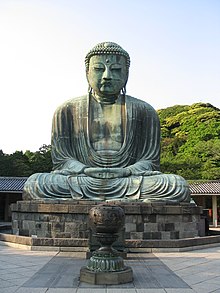You are currently logged-out. You can log-in or create an account to see more talks, save favorites, and more. more info
Buddhism Talks

Buddhism, also known as Buddha-dharma and Dharmavinaya, is an Indian religion and philosophy based on teachings attributed to the Buddha, a śramaṇa and religious teacher who lived in the 6th or 5th century BCE. It is the world's fourth-largest religion, with about 320 million followers, known as Buddhists, who comprise 4.1% of the global population. It arose in the eastern Gangetic plain as a śramaṇa movement in the 5th century BCE, and gradually spread throughout much of Asia. Buddhism has subsequently played a major role in Asian culture and spirituality, eventually spreading to the West in the 20th century.
According to tradition, the Buddha instructed his followers in a path of cultivation that leads to awakening and full liberation from dukkha (lit. 'suffering'; 'unease', 'unsatisfactoriness') by attaining nirvana, the 'blowing out' (extinguishing) of the passions. He regarded this path as a Middle Way between extreme asceticism and sensory indulgence, and also between the extremes of eternalism and nihilism. Teaching that dukkha arises alongside attachment or clinging, the Buddha advised meditation practices and ethical precepts rooted in non-harming. Widely observed teachings include the Four Noble Truths, the Noble Eightfold Path, and the doctrines of dependent origination, karma, and the three marks of existence. Other commonly observed elements include the Triple Gem, the taking of monastic vows, and the cultivation of perfections (pāramitā).
The Buddhist canon is vast, with philosophical traditions and many different textual collections in different languages (such as Sanskrit, Pali, Tibetan, and Chinese). Buddhist schools vary in their interpretation of the paths to liberation (xmārga, "path") as well as the relative importance and "canonicity" assigned to various Buddhist texts, and their specific teachings and practices. Two major extant branches of Buddhism are generally recognised by scholars: Theravāda (lit. 'School of the Elders') and Mahāyāna (lit. 'Great Vehicle'). The Theravada tradition emphasises the attainment of nirvāṇa (lit. 'extinguishing') as a means of transcending the individual self and ending the cycle of death and rebirth (saṃsāra), while the Mahayana tradition emphasises the Bodhisattva ideal, in which one works for the liberation of all sentient beings. Additionally, Vajrayāna (lit. 'Indestructible Vehicle'), a body of teachings incorporating esoteric tantric techniques, may be viewed as a separate branch or tradition within Mahāyāna.
The Mahāyāna branch, which includes the traditions of Tiantai, Chan, Pure Land, Zen, Nichiren and Tendai, is the largest branch of Buddhism, being predominantly practised in Nepal, Bhutan, China, Malaysia, Vietnam, Taiwan, Korea, and Japan. The second-largest branch, Theravada, is followed mainly in Myanmar, Thailand, Laos, Cambodia, and Sri Lanka. Tibetan Buddhism, a form of Vajrayāna, is practised in the Himalayan states as well as in Mongolia and Russian Kalmykia and Tuva. Japanese Shingon also preserves the Vajrayana tradition as transmitted to China. Historically, until the early 2nd millennium, Buddhism was widely practised in the Indian subcontinent before declining there; it also had a foothold to some extent elsewhere in Asia, namely Afghanistan, Turkmenistan, Uzbekistan, and Tajikistan.
| Title | Speaker | |
|---|---|---|
Buddhism and WarSerial: BZ-00133B The Six Realms and What Bodhisattvas Do in Each One, Saturday Lecture Buddhism, War, Bodhisattva, Six Realms, War, Demons, Greed, Peace, Current Events,... |
Mar 22 2003 Berkeley Zen Center |
|
Buddhist Perspectives On War: Sangha ViewsSerial: BZ-00072B Saturday Lecture War, Buddhism, War, Evil, Culture, Don't Know Mind, Interview, Birth-and-Death,... |
Apr 17 1999 Berkeley Zen Center |
|
Awakening Through Zen's Hidden Powers Buddha Nature, Emptiness, Buddhism |
Mar 03 1993 |
|
Is Buddhism a Religion? Yes, NoSerial: BZ-00684A Saturday Lecture Religion, Buddhism, Big Mind, Birth-and-Death, Continuous Practice, Discrimination,... |
Jan 25 1992 Berkeley Zen Center |
|
Everyday Enlightenment in Zen Moments Tenzo, Buddhism, Daily Life |
May 25 1990 |
|
Buddha’s Birthday Buddha's Birthday, Enlightenment, Buddhism |
Apr 05 1987 Berkeley Zen Center |
|
Development of American Buddhism: Kapleau-rôshi's Visit to SFZCSerial: BZ-00422A Saturday Lecture Buddhism, Philip Kapleau, Culture, Building, Daily Life, Tassajara, Diversity,... |
Feb 04 1984 Berkeley Zen Center |
|
Transient Nature of All Things and No-SelfSerial: BZ-00045A Saturday Lecture No-Self, Impermanence, Practice, Buddhism, Work |
Nov 06 1982 Berkeley Zen Center |
|
Japanese Practice/American Practice: DifferencesSerial: BZ-00039A Saturday Lecture Japan, Lay Practice, Family Practice, Practice, Buddhism, Japan |
Sep 04 1982 Berkeley Zen Center |
|
Blue Cliff Record, Case #35: Manjushri's "3's" and "3's"; NondiscriminationSerial: BZ-00034A Saturday Lecture BCR-35
Non-discrimination, Koan, Manjushri, Practice, Buddhism |
Jul 03 1982 Berkeley Zen Center |
|
Japanese Zen Practice in AmericaSerial: BZ-00029A Lecture Meditation, Alan Watts, Buddha Nature, Buddha, Time, Buddhism |
May 07 1982 Berkeley Zen Center |
|
Unification of Body and MindSerial: BZ-01058A Lecture Religion, Precepts, Buddhism, Darkness-and-Light, Peace, Priest, Tassajara, War... |
May 16 1980 Tassajara |